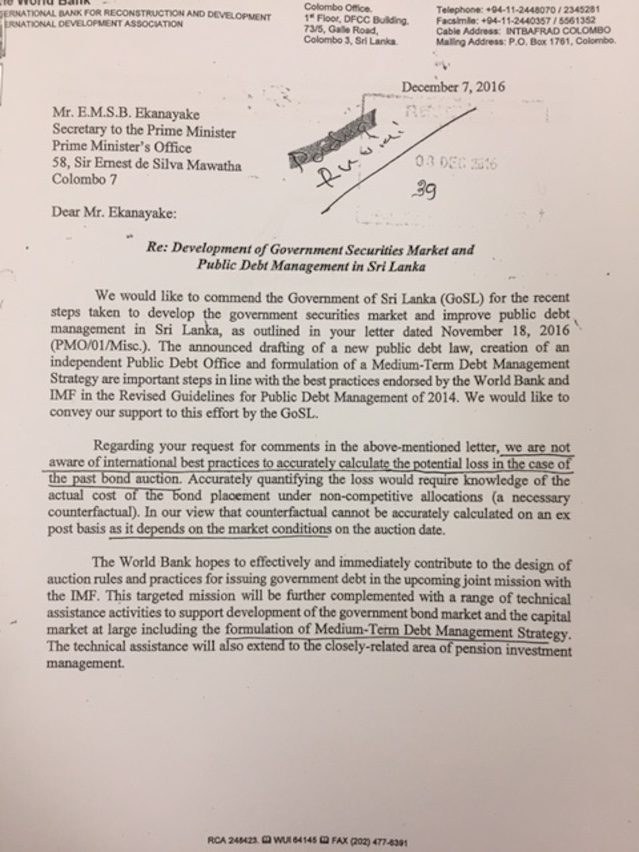A Brief Colonial History Of Ceylon(SriLanka)
Sri Lanka: One Island Two Nations
A Brief Colonial History Of Ceylon(SriLanka)
Sri Lanka: One Island Two Nations
(Full Story)
Search This Blog
Back to 500BC.
==========================
Thiranjala Weerasinghe sj.- One Island Two Nations
?????????????????????????????????????????????????Monday, January 30, 2017
World Bank Distances Itself From Arjuna Mahendran’s Bond Scam

January 29, 2017
The World Bank has officially distanced itself from the controversial Central Bank bond scam committed by ex-Governor Arjuna Mahendran citing
that they are not aware of the international best practices to
accurately calculate the potential loss in the case of the past bond
auction.
 In a letter addressed to M. S. B Ekanayake, Secretary to Prime Minister Ranil Wickremesinghe on
December 7, 2016, the World Bank Country Director to Sri Lanka Idah
Pswarayi-Riddihough referring to the letter sent by Ekanayake dated
November 18, 2016 said, “Regarding your request for comments in the
above mentioned letter, we are not aware of international best practices
to accurately calculate the potential loss in the case of the past bond
auction. Accurately quantifying the loss would require knowledge of the
actual cost of the bond placement under non-competitive allocations (a
necessary counterfactual). In our view that counterfactual cannot be
accurately calculated on an ex post basis as it depends on the marker
conditions on the auction date.”
In a letter addressed to M. S. B Ekanayake, Secretary to Prime Minister Ranil Wickremesinghe on
December 7, 2016, the World Bank Country Director to Sri Lanka Idah
Pswarayi-Riddihough referring to the letter sent by Ekanayake dated
November 18, 2016 said, “Regarding your request for comments in the
above mentioned letter, we are not aware of international best practices
to accurately calculate the potential loss in the case of the past bond
auction. Accurately quantifying the loss would require knowledge of the
actual cost of the bond placement under non-competitive allocations (a
necessary counterfactual). In our view that counterfactual cannot be
accurately calculated on an ex post basis as it depends on the marker
conditions on the auction date.”
Despite the World Bank officially distancing itself from the
controversial treasury bond scam which reportedly resulted in the
country losing Rs. 1.6 billion, several State-owned publications
including the Sunday Leader newspaper which is now run by Finance
Minister Ravi Karunanayake and Arjuna Mahendran’s Son-in-law Arjun Aloysius wrongfully
reported the story saying that the World Bank had claimed the
government had not suffered any losses as a result of the bond issue.
“The World Bank was of the opinion that the government has not suffered
any losses as a result of the bond issue. Wickremesinghe had submitted
to the World Bank all details pertaining to Treasury bond transactions
in Sri Lanka. The World Bank had praised the government on the actions
taken to control debt and its tax reforms proposals,” the Sunday Leader story published today (January 29, 2017) said.
The two page letter by the World Bank country director also said that
with the GOSL’s efforts and collaborative support from the World Bank,
the IMF, will no doubt held enhance transparency and competition in the
government and corporate bond markers, improve public debt management
and bring Sri Lanka in line with international good practice.
Meanwhile, an economic expert said that the World Bank artfully got away
from being a supporter of the scandalous bond transaction; under the
conditions which it has laid down in the last sentence of paragraph 2 of
the letter which says, one can easily calculate the potential loss; on
the day of the first bond transaction, the market price of 30 year bonds
was available which is a non-competitive bond price and except
Perpetual Treasuries, all other dealers including NSB bid at that price.
“Even the Bank of Ceylon (BOC) bid at that price (that is, Rs 120 per Rs
100 bond) when it had submitted bids for Janashakthi Insurance (Rs 500
million) and Kalutara Bodhi Society (Rs 8 million). But the very same
BOC after 10.57 am had bid at Rs 90 per Rs 100 bond on behalf of PTL in
three bids: one Rs 3 billion, and the other two Rs 5 billion each.
Harsha de Silva read this letter in Parliament and the government has
shamelessly prostituted World Bank into this issue. If the government is
interested, it can ask itself why it sold a bond that could have been
sold at Rs 120 per Rs 100 bond for Rs 90 and incurred an opportunity
loss of Rs 1500 million (that is: [(5000)/100]30 )in a single
transaction. It is not World Bank at error but the government which has
used an explanatory letter from World Bank for its own petty political
gains,” he said.
